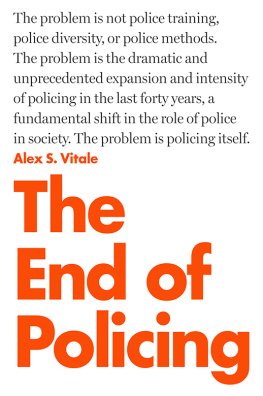Policing
First published by Willan Publishing 2002
This edition published by Routledge 2013
2 Park Square, Milton Park, Abingdon, Oxon OX14 4RN
711 Third Avenue, New York, NY 10017 (8th Floor)
Routledge is an imprint of the Taylor & Francis Group, an informa business
Alan Wright 2002
The right of Alan Wright to be identified as author of this work has been asserted by him in accordance with the Copyright, Designs and Patents Act of 1988.
All rights reserved; no part of this publication may be reproduced, stored in a retrieval system, or transmitted in any form or by any means, electronic, mechanical, photocopying, recording or otherwise without the prior written permission of the Publishers or a licence permitting copying in the UK issued by the Copyright Licensing Agency Ltd, 90 Tottenham Court Road, London W1P 9HE.
First published 2002
Paperback Hardback
ISBN-10: 1-903240-17-4
ISBN-13: 978-1-903240-17-5
Hardback
ISBN-10: 1-903240-18-2
ISBN-13: 978-1-903240-18-2
British Library Cataloguing-in-Publication Data
A catalogue record for this book is available from the British Library
Contents
List of figures
Preface
Understanding the nature and meaning of policing is just as important for members of the police and other criminal justice agencies is it is for academics. The complexities of the subject mean that practitioners need to reflect on their work. In doing so, they need to draw upon theory, empirical evidence and practical experience. Like criminology itself, police studies is a hybrid discipline. In reflecting on the practice of policing, it draws upon sociological, psychological and historical insights. However, as Michael Oakeshott argued in Experience and Its Modes (1933), no single mode of experience (practice, history or science) is complete in itself. Although it might sometimes seem to cut against the grain of contemporary criminology, I hope that this narrative is a balanced account across these modes of experience. That I have injected some (admittedly lightweight) philosophical discussion into the arguments of this book should perhaps be not too surprising, given that my long-term interest is in political theory. In my view, it is crucial to clarify the origins and meaning of policing in order to make sense of empirical claims about its character. The latter do not speak for themselves in any significant way that is prior to an understanding of the origins and meaning of the practice. In this sense, although this book contains no radical research findings or profound claims for changes to policing, I hope it provides a reasoned overview of a complex subject. Inevitably, there will be faults and omissions. The narrative has not travelled far but I hope it is in the right direction.
My thanks are due to a number of people who have commented on drafts of the manuscript. In particular, Marc Jacobs (Institute of Criminal Justice Studies, University of Portsmouth), Amanda Matravers (Institute of Criminology, University of Cambridge) and Rob Mawby (Staffordshire University) deserve special thanks for their constructive comments. Thanks are also due to Les Johnston and Frank Leishman (series editors) for their help and advice. The publisher, Brian Willan, deserves an accolade for his patience and for encouraging me to finish the manuscript. Finally, my sincere thanks are due to the many people who have provided me with a great deal of inspiration over the years. The encouragement of John Alderson, Mike Chatterton, Frank Gregory, Barry Loveday, Ian McKenzie, Ken Pease, Steve Savage and Jerry Skolnick are greatly valued. I am particularly indebted to Dr Rob Mawby of Staffordshire University for his kindness, patience and ability in more than one project. If there is anything worthwhile in this book, it will be to the credit of their influence. Readers will rightly lay its failings at my door.
Alan Wright
University of Portsmouth
August 2001
Introduction
This book is an introduction to the study of policing. Often surrounded by controversy, policing is a subject that arouses considerable interest from the public and professionals alike. Indeed, the subject is intrinsically interesting. In fact and in fiction, policing has been awash with human drama. As a consequence, it has been the frequent subject of media and literary attention since the 19th Century. Since the 1960s, however, it has also come under intense critical scrutiny from criminologists and sociologists. There has been a rapid expansion of the academic literature on the subject, aimed at producing a more rigorous account of the phenomenon and its effects.
Of course, there are already many excellent books on policing. Reiners The Politics of the Police is a seminal text (Reiner, 1992a; 3rd edition, 2000a). Bayleys Police for the Future (1994) is a blueprint for a new approach to policing and crime prevention. Waddingtons Policing Citizens (1999) puts forward a theory of the exercise of power and authority by the modern police. Johnstons Policing Britain: Risk, Security and Governance (2000) analyses the changing forms and functions of the police and their implications for society. Core Issues in Policing sets out a wide-ranging analysis of policing from a number of contributors (Leishman, Loveday and Savage, 2000). All of these works are notable for their scholarship and depth of analysis. Despite the evident value of these volumes, there remains some space for an introductory but critical text, providing a study of policing practice in the context of historical and contemporary paradigms of social and political thought.
The main aims of this book are:
- to explore the concept, context and practice of policing;
- to provide an accessible text for those who are comparatively new to academic debate on the subject;
- to provide an analysis of sufficient depth to reflect the complexity of the issues.
It does not seek to justify any particular type of policing or to convince the reader of the effectiveness of any single form of policing. On the contrary, its central thesis is that policing in a democracy takes many forms. Focusing primarily on British policing, the book discusses the ways in which the meaning and practice of policing are changing in the light of the challenges faced by the public police and other criminal justice agencies.
In addition to the critical content, the text asks readers to explore questions of meaning that criminology sometimes ignores. From the outset, it raises questions about the variety of ways in which the terms police and policing are used: about their conceptual contestability and ambiguity. It suggests that we will not find answers to the question, What is policing? in the empirical analysis of functions of the police. We will find them in the conflicting paradigms of thought within which policing is located. In this sense, as we shall see in Chapter 2, policing can no longer simply be understood solely as the activity of the public police institution. Accordingly, where the term policing appears in the text, we need to take care not to assume that it refers only to the activities of the public police. We use it in this sense in Chapter 1, because the public police have in the past been the primary agency for carrying out policing activities. However, from Chapter 3 onwards, we extend the meaning of the term to include the activities of other agencies. For these reasons, it has been necessary to pose a few questions about the way in which the meaning of the terms police and policing have developed. I hope that readers who have an aversion even to a little philosophy will persevere with the sections that deal with these questions. They are important because they provide some of the answers to why it is now necessary to think differently. Why we now need to think not just of the public police which has existed in institutional form since the early nineteenth century, but of policing in its wider sense.






